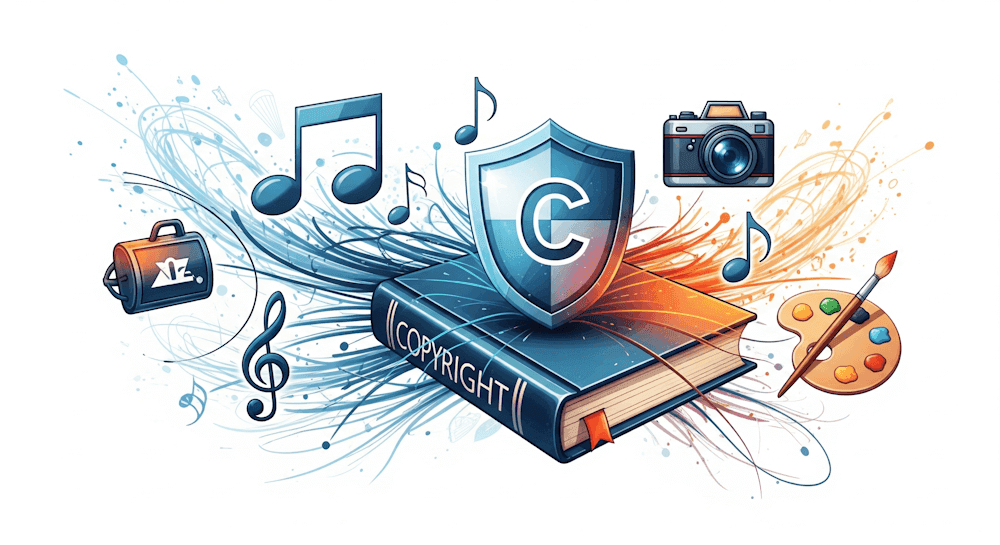Ever created something and thought, “Wait... what if someone just copies this?” Yeah. That’s exactly the kind of fear copyright laws are meant to handle.
But let’s not make it too formal—because honestly, copyright isn’t that complicated once you drop the lawyer speak.
Let’s break it down, real-world style.
So What the Heck Is Copyright?
Okay, here’s the short version: Copyright is the legal right to say, “I made this. Don’t steal it.”
It protects the expression of your ideas. Not the idea itself, but the way you put it out into the world.
Wrote a poem? Shot a video? Designed a funky t-shirt graphic? Boom. Copyright.
You don’t even need to file anything to have copyright. It’s automatic the moment your work exists in a tangible form. So no, that genius story idea in your head isn’t copyrighted. But once you write it down—it is.
What Can Be Copyrighted?
People think it’s just books and songs, but it’s way more than that. Stuff that gets copyright protection includes:
- Novels, blogs, articles
- Music (the lyrics, the melody, the whole vibe)
- Movies, short films, videos
- Paintings, sketches, digital art
- Code—yup, computer programs are covered
- Architectural designs
- Choreography
- Even technical drawings, ads, and maps
But again—not ideas, methods, or facts. Just how they’re expressed.
Stuff That Doesn’t Get Copyrighted
Some people get this twisted. Copyright doesn’t protect:
- Titles or slogans (those might fall under trademarks)
- Ideas or concepts
- Recipes (unless you wrote a full cookbook with original commentary)
- Business methods
- Random facts
So if you invent a workout method or a business framework—you better look into patents or trade secrets. Copyright’s not gonna help there.
So What Rights Does Copyright Actually Give You?
Here’s the cool part. Copyright isn’t just “you can sue people” (though yeah, you can). It gives you two main categories of rights:
Economic Rights
This is the money part. You get to:
- Reproduce your work (make copies, prints, digital files)
- Sell or license it
- Perform it publicly (like songs or plays)
- Broadcast it (radio, YouTube, wherever)
- Translate it
- Adapt it (like turning your novel into a movie)
No one else gets to do any of that without your say-so. You can also rent or license your work out—just like you’d rent a house.
Moral Rights
This is more personal.
It lets you:
- Claim credit as the creator (even if you sold it)
- Say no to changes that mess with your work or harm your reputation
So if someone tweaks your poem into something offensive—you can fight back. It’s about dignity, not dollars.
How Long Does Copyright Last?
In India, it’s pretty generous. For most works (like books, songs, paintings), it lasts for:
60 years after the creator’s death
That’s right. You die, and your kids still get the rights. Not bad, huh?
For corporate stuff (like work done by a company or under contract), it’s 60 years from the date of publication.
Do You Need to Register Copyright?
Technically? No. Legally? It’s automatic once you create the thing.
BUT—if you want to sue someone or prove you created something first, registration is super helpful. It’s like having a paper trail in case stuff gets messy.
Real-World Copyright Situations
- You post an original song on YouTube. Someone rips the audio, uploads it under their name. You can file a takedown and sue.
- You write a blog post. A website copies it word-for-word. That’s copyright infringement.
- You design a cool illustration. Another brand uses it in ads. You can demand payment or legal action.
Moral of the story: if you created it, you can control how it’s used. Simple as that.
What If You Accidentally Infringe Someone Else’s Work?
Yikes. It happens more than people admit.
Just because something’s online doesn’t mean it’s free. Grabbing an image off Google and using it in your blog post = risky. Using background music in a reel = also risky unless it’s royalty-free or licensed.
To stay safe:
- Use licensed or original content
- Always credit the source (even if not legally required)
- When in doubt? Don’t use it
Final Thoughts
Copyright is one of the chillest types of IP to get your head around.
You make something → You own it → You control it
No paperwork needed (but it helps), and no one can take credit or use it without your permission. It’s protection made for the creative minds out there.
So if you’ve made something, even small—respect your own rights. And maybe also respect other people’s. That’s how the creative world keeps spinning.
Catch up on previous blogs:


